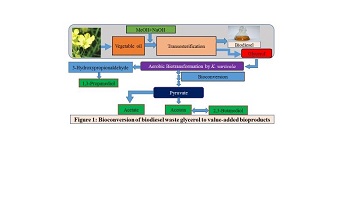
Wensheng qin
Lakehead University, Canada
Title: Effective microbial production of 2,3-butanediol from Biodiesel derived crude glycerol
Biography
Biography: Wensheng qin
Abstract
Biodiesel, a renewable biofuel, is produced from vegetable oils and animal fats by transesterification. The booming of biodiesel industry all over the world has led to generate a large amount (10% v/v) of crude glycerol, created an oversupply problem. The high volume of this non bio-degradable glycerol is becoming of a great environmental and economic concern for the development of biodiesel industries. Herein, we report the product concentrations of major metabolic products attained from pure and crude glycerol biotransformation process using an adapted mutant strain Klebsiella variicola SW3. Real-time qPCR and glycerol dehydrogenase (GDH) enzyme activity assay revealed that the overexpression of GDH gene resulted in an increased GDH enzyme activity, led to a markedly boosted 2,3-butanediol (2,3-BD) production. Based on these results, the SW3 strain obtained from wild type strain Klebsiella variicola SRP3 displayed a 1.39-fold increased 2,3-BD production of 82.5 g/L from 59.3 g/L, yielding 0.62 g/g using pure glycerol. However, in a batch culture, a final 33.5 g/L of 2,3-BD was accumulated within 96 hours from 50 g/L glycerol. Moreover, the strain SW3 withstanding high concentration (200 g/L) of crude glycerol displayed 64.9 and 29.25 g/L 2,3-BD in fed-batch and batch cultures respectively. These results indicated that our newly developed adapted mutant can tolerate high concentration of glycerol, have a high glycerol utilization rate and high product yield of 2,3-BD. It is demonstrated that the mutant strain K. variicola SW3 has an ability to produce fewer co-products at trace concentrations at higher glycerol concentrations and could be a potential candidate for 2,3-DB production in an industrial bioconversion process.Therefore, this bioconversion of crude glycerol to 2,3-BD; a valueadded green product with potential industrial applications as a liquid fuel or fuel additive would represent a remarkable alternative to add value to the biodiesel production helping biodiesel industries development.


